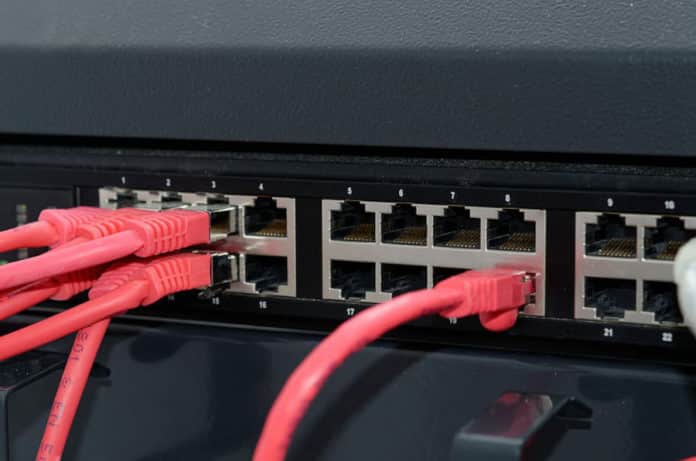Routers are networking devices that are in charge of forwarding data packets between separate computer networks.
Enterprises with multiple networks that need connecting use routers to direct data packets traveling through the internet or Ethernet.
See below to learn all about the global enterprise router market:
The enterprise router market
The global enterprise routers market has an estimated value of $15.1 billion in 2022. By 2027, it is expected to reach a value of $22.9 billion, following a compound annual growth rate (CAGR) of 8.6% in the forecast period 2022 to 2027.
Several countries, are driving growth in the market:
- The Canadian market grew by 6.1% year over year
- The Latin American market grew by 4.8%
- Western Europe’s routers market increased by 3.1%
- China’s market was up 5.5%
- The Asia-Pacific market increased 19.4%
The end-user vertical of banking, financial Services, and insurance (BFSI) has the biggest demand in the enterprise router market. Other notable industries include:
- IT and telecommunication
- Health care
- Retail
- Manufacturing
Enterprise router features
As networking hardware, routers receive, analyze, and resend data packets from the network’s modem. They monitor the desired destination address to determine the optimal transfer route for speed and efficiency.
There are multiple types of networking routers, depending on the type and size of the network. Some of which include:
- Core routers
- Edge routers
- Virtual routers
- Broadband routers
- Wired routers
Enterprise-grade routers tend to have a set of key features:
- Guest Wi-Fi access
- Virtual private network (VPN) server and client
- Virtual local area network (LAN)
- Built-in malware detection
- USB ports
- Quality of service (QoS)
- High gigabit Ethernet
Enterprise router benefits
Routers aren’t only essential for enterprises to set up functional, cross-office networks, they also provide numerous benefits:
- Highly stable and reliable
- Easy to scale and extend
- Cost-efficient
- Simplify network management for IT
- Built-in defense and cybersecurity capabilities
- Provide insights and reports into the network
- Packet filtering
- Network traffic control
“The router is a fundamental building block of modern business networks, providing traffic with a gateway to both the internet and other networks,” says Andy Walton at azcentral.
“Routers make flexible cross-network communication possible and allow larger networks to remain operational even during redesigns or outages.”
Enterprise router use cases
Here are a pair of examples of how organizations used enterprise networking routers to improve their network performance and connectivity.
Fukushima City Board of Education
The Fukushima City Board of Education is one of many Japanese institutions that distributed about 20,000 iPads to city schools as part of their project for “Fukushima-type online classes.” They are dedicated to providing students unable to attend school in emergency situations with proper access, enabling them to continue their education from home.
The city’s board of education had trouble managing the traffic of 20,000 iPads on their wide area network (WAN), connecting through fiber-optic cables and segmented according to use. Simply upgrading the city’s current infrastructure was too costly of an option.
The board opted to switch to the Cisco SD-WAN solution. It allowed better control of traffic incoming to the network for easier management and prevention of bottlenecks. Additionally, SD-WAN routers in schools were equipped with advanced firewalls for an added layer of security.
“On the first day of the Fukushima-type online classes, I was very nervous. But once I had verified that the iPad environment worked, I was relieved,” says Takeshi Abe, a member of the Fukushima City Board of Education.
“With [the] Cisco SD-WAN solution controlling the traffic, we will be ready to tackle all kinds of situations that may arise in the future.”
ZettaNet
ZettaNet is an Australian provider of network management services and an internet service provider (ISP) mainly to managed service providers (MSPs). The company has offerings ranging from fiber-based Ethernet and voice over IP (VoIP) to web hosting and data center colocation.
ZettaNet needed a way to keep up with rising customer demand for more bandwidth, wanting 1 Gbps of connectivity between locations without compromising on price.
Instead of changing providers, ZettaNet migrated from older Juniper routers without changing their architecture. This enabled their customers to connect to ZettaNet’s network using the SRX Series Services Gateways from Juniper Networks.
“Juniper understands our business, and the Juniper team has gone above and beyond to help us grow,” says Simon Dixon, a network manager at ZettaNet.
“A Juniper network enables us to meet booming growth. We envision that we can serve 10 times more customers without buying more infrastructure.”
Enterprise router providers
Some of the leading providers of enterprise routers in the market are:
- Cisco
- Juniper Networks
- Hewlett Packard Enterprise (HPE)
- Arista Networks
- Nokia
- Huawei
- Cumulus Networks
- NETSCOUT
- Dell Technologies
- Extreme Networks



